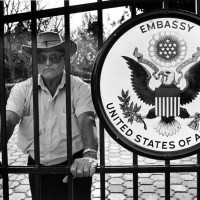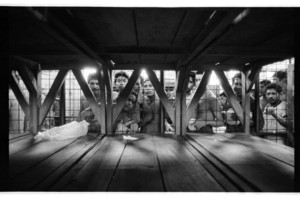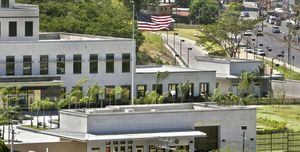
Note: Our accounts contain the personal recollections and opinions of the individual interviewed. The views expressed should not be considered official statements of the U.S. government or the Association for Diplomatic Studies and Training. ADST conducts oral history interviews with retired U.S. diplomats, and uses their accounts to form narratives around specific events or concepts, in order to further the study of American diplomatic history and provide the historical perspective of those directly involved.
It is a commonly held belief that while abroad as a U.S. citizen, the American government and its embassy will do what it can to protect you. While this may be true in most situations, it is not always the case.
During the late 1970s, a South Carolina citizen traveled to Managua, Nicaragua and stayed at the Intercontinental Hotel (now the Crowne Plaza Hotel); while there he ran up a bill of $30,000 while waiting for approval for his "business" from President Somoza. Hotel management grew impatient and had the Managua police arrest him. The man somehow escaped jail and made his way to the U.S. Embassy to seek asylum, where he stayed for six long, aggravating weeks. This account was compiled from an interview by ADST with Charles Anthony "Tony" Gillespie in 1995, the Administrative Officer for the U.S Agency for International Development (USAID) in Managua from 1976 to 1978. Read the entire account on ADST.org. GILLESPIE: [T]he Intercontinental Hotel was believed to be easy plucking for con men. They would take people for their money. They want to make some easy money.
This account was compiled from an interview by ADST with Charles Anthony "Tony" Gillespie in 1995, the Administrative Officer for the U.S Agency for International Development (USAID) in Managua from 1976 to 1978. Read the entire account on ADST.org. GILLESPIE: [T]he Intercontinental Hotel was believed to be easy plucking for con men. They would take people for their money. They want to make some easy money.
It turned out that there was a man from South Carolina, whose name was Arthur something...He had a scheme for some kind of a textile operation in Nicaragua. He had probably come to Nicaragua either in late 1976 or early 1977 and had been living in the Intercontinental Hotel. Initially, he had paid his bills, which amounted to some tens of thousands of dollars, and everything was fine.
By late 1978, he was still waiting to see Somoza and get approval for his investment scheme. He was now unable to pay his bill at the Intercontinental Hotel, so the hotel people eventually went to the Police or the government. The police arrested this guy, an American citizen from South Carolina. He was put into jail for non-payment of his bill, which amounted to about $30,000. He couldn't get together the money.
Somehow, he escaped from jail and appeared at the door of the U.S. Embassy -- inside the gate and past the guard. I was called to come down to the door because I was in charge of security and all of that. The Assistant GSO [General Services Officer] was there, because he was also the post Security Officer.
Art was a not very attractive human being, from the physical point of view. He turned out to be even less attractive in every other respect. He said, "I'm not leaving. You can't get me out of here. I'm not walking out there. I'm not going back to that jail. They beat me." He alleged human rights violations and said that he wanted "asylum."
I explained that we don't give asylum to American citizens. I said, "Get out of here."
Anyhow, we reported this case to the Department. He spent six weeks living in the little dispensary that we had on the ground floor of the Embassy....
It turned out that Arthur had serious problems with diabetes. He needed insulin and all of that. He smoked cigars -- couldn't live without cigars. He needed a special diet.  The Nicaraguans were sending us diplomatic notes, requesting that we turn this guy over to them. We didn't particularly like the Somoza government, but Arthur gave us special problems. We went through FAM, the Foreign Affairs Manual, which tells you how to deal with cases like this.
The Nicaraguans were sending us diplomatic notes, requesting that we turn this guy over to them. We didn't particularly like the Somoza government, but Arthur gave us special problems. We went through FAM, the Foreign Affairs Manual, which tells you how to deal with cases like this.
Finally, after six weeks we got the right instruction that we had been asking for, which was permission for the Embassy to give him back to the Nicaraguan authorities. We had considered every option. Could we fly him out? How could he get to the airport? He couldn't leave legally.
If we got him out of the country, we would be violating Nicaraguan law. He had no diplomatic immunity. Of course, he was a constituent of some Member of Congress. The instruction from the Department authorized us to hand him back to the Nicaraguans. He said he wouldn't leave, which we had reported to the Department. In turn, the Department authorized us "to use whatever reasonable force is required to eject him" from the Embassy building.
We had these instructions from the Department. We had a back gate to the Embassy, which is pretty exposed all the way around. The press wasn't in sight. They were around initially, when they thought that there was a story in this. However, interest had dwindled.
We worked it out that we could take this guy to the back gate of the Embassy and turn him over to the Managua Police. Not the Guardia Nacional, although the Police really came under the Guardia Nacional. We would ask the Police to drive up to the back gate to the Embassy at a precise time and we would turn over this man. We would tell the Foreign Ministry that this was how we proposed to handle the matter.
This was our plan, but at this point we still had not informed the Nicaraguan authorities of what we planned to do. I think that it was Jay Freres, the Economic Officer, who said, "You know, I've been through something like this before, and you'd be amazed at how many unexpected things can happen. Why don't we rehearse what we're going to do before we talk to the Nicaraguans?" We all thought that that was a great idea, so we scripted this show from start to finish. We would tell Arthur that the Ambassador needs to talk to him, because the instructions from the Department stated that, "The Ambassador is to inform him directly and personally that he is no longer welcome at the Embassy and that he has to leave. If he doesn't go voluntarily, he will be ejected." This was all Miranda language cautioning him about his rights. In effect, we would read him his rights.
We all thought that that was a great idea, so we scripted this show from start to finish. We would tell Arthur that the Ambassador needs to talk to him, because the instructions from the Department stated that, "The Ambassador is to inform him directly and personally that he is no longer welcome at the Embassy and that he has to leave. If he doesn't go voluntarily, he will be ejected." This was all Miranda language cautioning him about his rights. In effect, we would read him his rights.
So we said, "Okay, Jay, this was your idea. You get to be Arthur." We would bring him into the Ambassador's office. He would stand in front of the Ambassador's desk. The Ambassador would remain seated at his desk. Maybe he would stand up to talk to Arthur, but we didn't want Arthur to reach over and hit the Ambassador or do anything crazy. The Ambassador was to keep his desk between them.
We had 12 Marines assigned to the Embassy. We decided to have the Gunnery Sergeant the NCO [non-commissioned officer] in command of the Marine Guard detachment and three of his stronger Marines in the back of the Ambassador's office and not immediately visible when Arthur walked in the door. I would be there with the Assistant GSO.
The nurse would be right outside the door of the Ambassador's office, if she were needed for any reason. When we brought him over to the Ambassador's office, she would put all of his belongings in a bag and bring them with her to the door to the Ambassador's office.
So we started our dress rehearsal. I went to get Jay Freres who was standing in for Arthur and took him to the Ambassador's office, standing him in front of the Ambassador's desk.
Ambassador Solaun himself was sitting there. Everybody else except Jay Frere, standing in for Arthur was a real person, standing in his or her appointed position. The Ambassador stood up and said, "Well, Mr. So-and-So, I now have my instructions from Washington. You are to turn yourself in to the Nicaraguan authorities, subject to Nicaraguan law." The Ambassador read from a prepared script.
Jay looked around in panic, reached over onto the desk, grabbed a letter opener, and lunged for the Ambassador. He said, "You'll never get me out of here!" Then the Marines ran over and grabbed him.
Well, we ran through this dress rehearsal twice more. We made sure that there would be nothing within this guy's reach with which to threaten the Ambassador. We actually practiced with Jay Freres how the Marine Guards would hold him with the minimum chance of hurting him, so that we restrained him but would not break an arm or anything else. So we told the Nicaraguan Police and the Foreign Ministry what we were going to do, and on the next morning we did it. I went to get this guy and brought him to the Ambassador's office. He sensed that this would not be good news, although I tried not to indicate this in any way.
So we told the Nicaraguan Police and the Foreign Ministry what we were going to do, and on the next morning we did it. I went to get this guy and brought him to the Ambassador's office. He sensed that this would not be good news, although I tried not to indicate this in any way.
He started running around the Ambassador's office, yelling, "You will not get me out of here! I'm a dying man!" It was a real drama.
The Marine Guards came over and grabbed him. The Nicaraguan Police were at the back gate. We had Embassy officers as witnesses all along the route to the back gate, so we could say that we hadn't hit his head against the wall and that nothing had happened to him. We had towels on hand so that he couldn't hit his head.
That rehearsal really prepared us for what happened. Thank God that we had Jay Freres with the good sense to say, "Let's try this out in advance."
It was truly a traumatic event. We don't like to turn over American citizens to foreign governments. This guy was not going into nice people's hands. They weren't going to let him go easily.
As it turned out, we then pursued the matter with the Nicaraguan authorities. We said, "Look, you don't want this guy sitting around your jail. Deport him." And they did.
